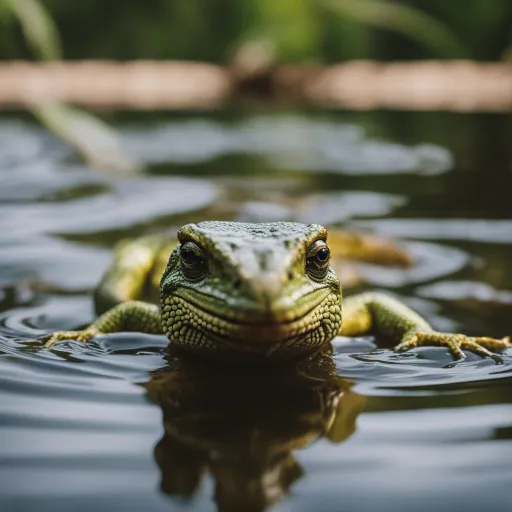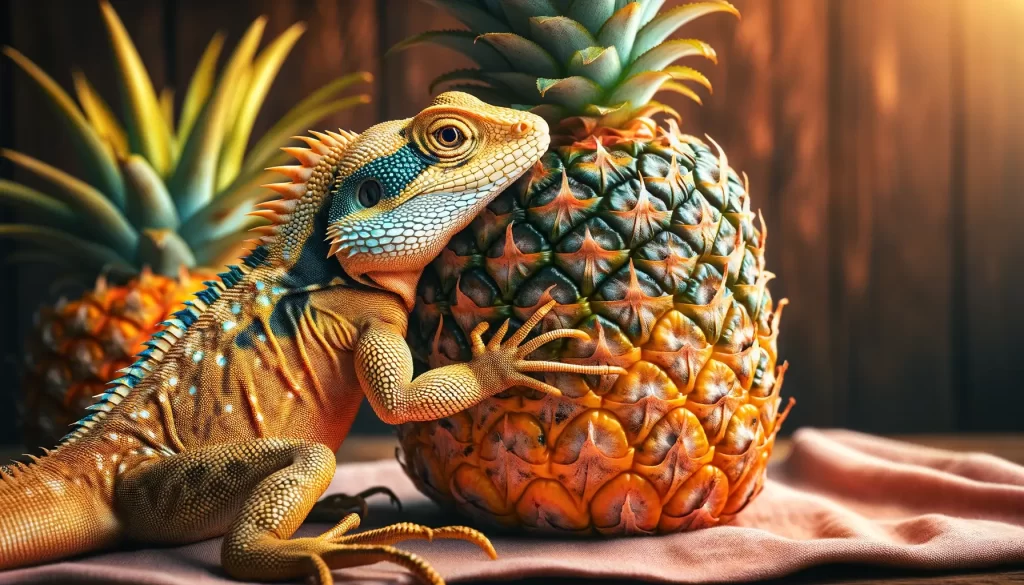
Did you know that lizards are known to have diverse diets, ranging from insects to fruits?
While it may come as a surprise, some lizard owners wonder whether pineapple can be a part of their reptile’s diet.
Yes, while lizards can technically consume pineapple, it’s not recommended as a regular part of their diet due to its high acidity and sugar content, which can potentially disrupt their digestive system and lead to health issues. It’s advisable to opt for safer fruits that cater to their specific nutritional needs, such as berries, melons, and papayas.
In this article, we will delve into the dietary needs of lizards and explore the possibility of including pineapple in their meals.
We will discuss the nutritional requirements of lizards, examine the risks associated with feeding pineapple to these creatures, and provide recommendations for safe fruits to include in their diet.
Key Takeaways:
- Lizards have diverse dietary needs that vary by species, requiring a balanced diet of proteins, vitamins, minerals, and hydration to thrive.
- While pineapple is rich in vitamins and minerals beneficial for lizards, its high acidity and sugar content may disrupt their delicate digestive system, leading to potential health issues.
- Feeding pineapple to lizards poses risks due to its acidity and sugar, potentially causing digestive disturbances, obesity, and other health concerns.
- Safe fruits for lizard diets include apples, berries, watermelon, papaya, and mango, which provide essential nutrients without the risks associated with pineapple.
- Expert opinions and research emphasize the importance of a varied diet with fruits making up no more than 10% to avoid digestive issues and ensure lizards’ well-being, recommending cautious introduction and monitoring of new fruits.
Understanding Lizards’ Dietary Needs
When it comes to providing proper care for your pet lizard, understanding their dietary needs is crucial.
Lizards have specific requirements for their nutrition, including a natural diet that aligns with their biology.
Let’s explore the natural diet of lizards and their nutritional requirements to ensure they stay healthy and thrive in captivity.
Natural Diet Of Lizards
Lizards have a diverse range of natural diets, as they are a diverse group of reptiles. The specific food sources lizards consume can vary depending on their species and habitat.
In the wild, lizards feed on insects, small vertebrates, fruits, and plants. Some lizards are herbivores, while others are carnivores or omnivores.
It’s essential to consider the natural dietary preferences of your specific lizard species when determining their nutritional needs.
Nutritional Requirements Of Lizards
Meeting the nutritional needs of lizards is vital for their overall health and well-being.
Lizards require a balanced diet that provides them with the required vitamins, minerals, and macronutrients.
Nutritional requirements can vary among different lizard species, but some common nutritional needs include:
- Protein: Lizards need a sufficient amount of protein for growth, tissue repair, and maintaining their immune system.
- Calcium: Calcium is crucial for proper bone development and preventing metabolic bone disease.
- Vitamins: Lizards need specific vitamins, such as vitamin A, to support their overall health.
- Hydration: Adequate hydration is essential for lizards to maintain their physiological functions and prevent dehydration.
Providing a varied diet that incorporates these essential nutrients is key to ensuring your lizard’s nutritional needs are met.
Pineapple And Lizards: A Detailed Look
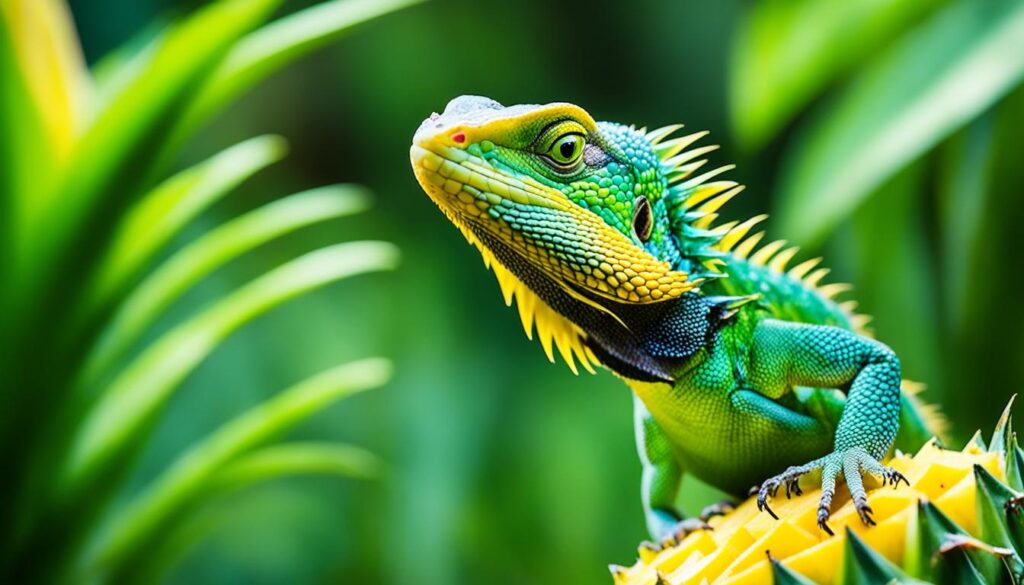
When considering the potential inclusion of pineapple in a lizard’s diet, it is important to examine its nutritional content and evaluate whether lizards can effectively digest it.
Let’s take a closer look at these aspects.
Nutritional Content Of Pineapple
Pineapple is known for its refreshing taste and vibrant tropical flavor. But what does it offer in terms of nutrition for lizards?
Pineapple is rich in vitamins, particularly vitamin C, which is essential for a strong immune system.
It also contains vitamin A, which promotes healthy vision, and B vitamins that aid in energy metabolism.
Moreover, pineapple provides essential minerals like manganese, which supports bone health, and copper, which is involved in various enzymatic reactions within the body.
Can Lizards Digest Pineapple?
The digestive capabilities of lizards play a crucial role in determining which foods they can effectively process.
While lizards are generally omnivorous, their ability to digest certain plant-based foods can vary.
When it comes to pineapple, lizards may face challenges due to its fibrous nature and high water content.
These factors can impact the breakdown and absorption of nutrients from pineapple.
The efficiency of digestion may differ among lizard species, so it is important to consider the specific needs and tolerances of your pet lizard before feeding them pineapple.
While pineapple can provide some nutritional benefits, it is essential to ensure that any food offered to lizards aligns with their dietary needs and capabilities.
Now that we have explored pineapple’s nutritional content and digestive considerations, let’s move on to the potential risks associated with feeding pineapple to lizards in the next section.
The Risks Of Feeding Pineapple To Lizards

Feeding pineapple to lizards may come with certain risks. In order to understand these risks, it is important to consider two key factors – acidity and sugar content.
Acidity And Sugar Content
Pineapple is known for its high acidity due to the presence of citric acid. This can pose a problem for lizards, as they have a more delicate digestive system compared to humans.
The high acidity of pineapple can potentially disrupt the pH balance in a lizard’s digestive tract, leading to digestive issues and discomfort.
In addition to acidity, pineapple also has a relatively high sugar content. While some fruits are considered suitable for lizards in moderation, the sugar content in pineapple may be too high for them to process efficiently.
Excessive sugar intake can contribute to obesity and other health concerns in lizards.
Potential Health Concerns
Regularly feeding pineapple to lizards can pose potential health risks. The combination of high acidity and sugar content may lead to digestive disturbances, including diarrhea and bloating.
Additionally, the sugar in pineapple can contribute to dental issues and metabolic imbalances in lizards.
To ensure the well-being of your lizard, it is crucial to carefully consider the risks associated with feeding pineapple.
It may be best to consult with a reptile veterinarian or an expert in reptile nutrition to determine the most appropriate and safe diet for your pet lizard.
Safe Fruits For Lizards
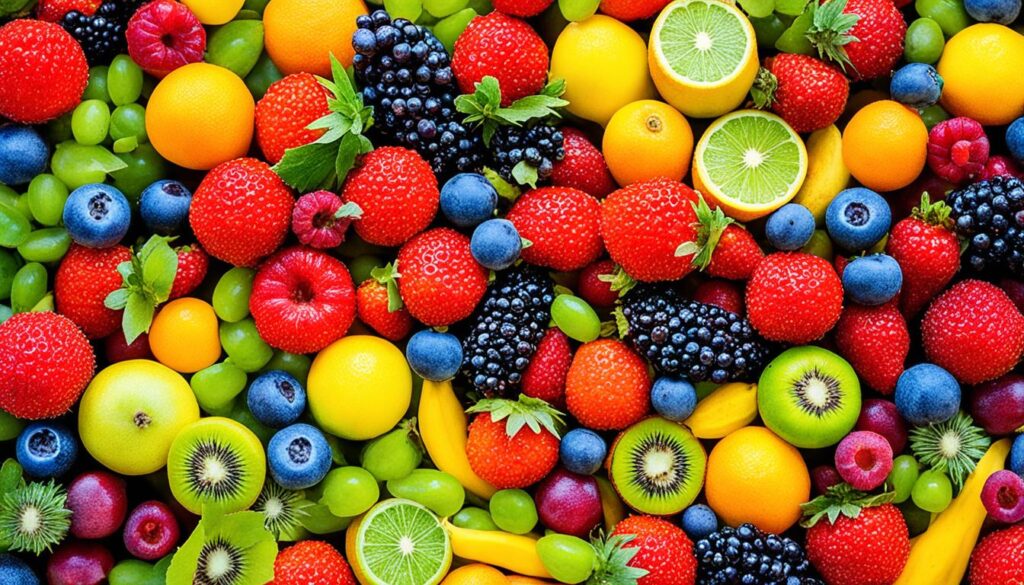
While pineapple may not be the best fruit for lizards, there are plenty of other options that can be safely incorporated into their diet.
These fruits provide essential nutrients and can help diversify their reptile diet. Here are some recommended fruits for lizards:
- Apples: Rich in vitamins A and C, apples are a safe and delicious treat for lizards. Make sure to remove the seeds and core before feeding them to your reptile friend.
. - Berries: Strawberries, blueberries, and raspberries are all excellent choices for lizards. Packed with antioxidants and fiber, they make for a healthy addition to their diet.
. - Watermelon: A refreshing treat, watermelon is high in water content and provides essential hydration for lizards. Remove the seeds and offer small, bite-sized pieces.
. - Papaya: This tropical fruit is not only full of vitamins and minerals but also contains enzymes that aid in digestion for lizards.
. - Mango: Packed with vitamin C, mangoes are a tasty and nutritious option for lizards. Remove the skin and offer small pieces to avoid overwhelming their digestive system.
It’s essential to introduce new foods into a lizard’s diet gradually and safely. Here are some tips for introducing new fruits:
- Start small: Begin by offering a tiny, bite-sized piece of the new fruit to see how your lizard responds. This allows you to monitor their reaction and ensure they tolerate the new food well.
. - Monitor for any adverse reactions: Keep a close eye on your lizard after introducing a new fruit. Look out for any signs of digestive upset, such as diarrhea or vomiting. If you notice any negative reaction, discontinue feeding that fruit and consult a reptile veterinarian.
. - Gradually increase the amount: If your lizard tolerates the new fruit well, gradually increase the portion size over time. This ensures proper digestion and minimizes the risk of any digestive disturbances.
. - Offer variety: Rotate different fruits in your lizard’s diet to provide a balanced and diverse nutritional intake. This helps prevent boredom and ensures they receive a wide range of beneficial compounds.
By offering safe fruits for lizards and introducing new foods gradually, you can provide a well-rounded and nutritious reptile diet for your beloved pet.
Expert Opinions On Lizards And Fruits
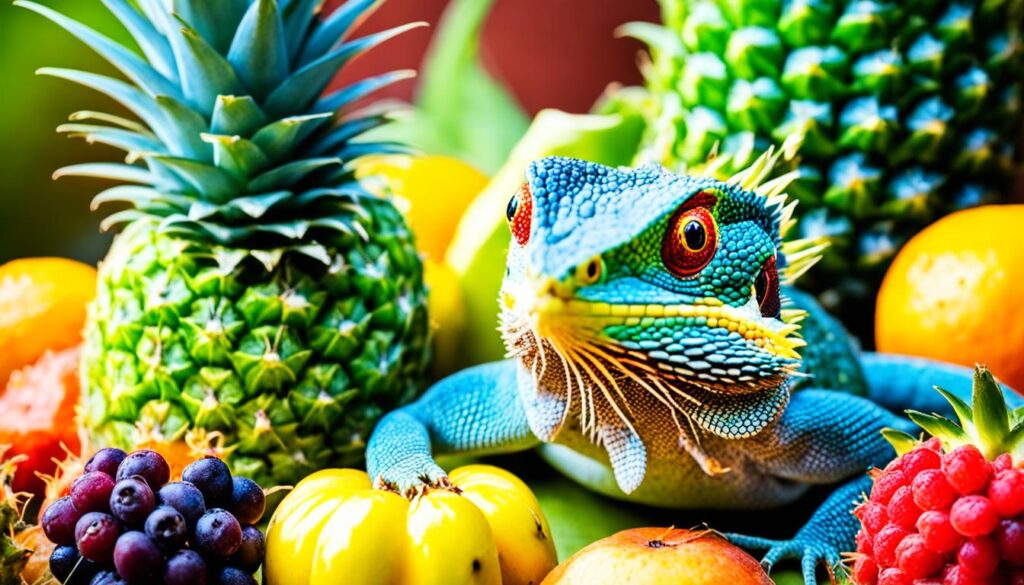
In order to provide a well-rounded perspective on the topic of lizards and fruits, it is important to consider the expert opinions of veterinarians who specialize in reptile care.
These professionals have extensive knowledge and experience in understanding the dietary needs and health considerations of lizards.
Their advice and recommendations can help lizard owners make informed decisions about their pets’ nutrition.
Veterinary Advice
Veterinarians unanimously agree that a balanced and varied diet is crucial for the overall health and well-being of lizards.
While fruits can be a part of a lizard’s diet, it is important to offer them in moderation and as a supplement to their primary food sources, such as insects and leafy greens.
According to veterinary experts, fruits should make up no more than 10% of a lizard’s diet to avoid potential digestive issues and imbalances in nutrient intake.
When it comes to specific fruits, veterinarians recommend choosing options that are safe for lizards and provide beneficial nutrients.
Fruits with a high water content, such as melons and berries, are often suggested as they can help hydrate lizards.
Additionally, fruits that are low in sugar and acidity, such as papaya and mango, are considered safer choices for lizards.
Veterinarians also emphasize the importance of observing individual lizard behavior and health when introducing new fruits to their diet.
Not all lizards may tolerate or enjoy the same fruits, so it is essential to monitor their response and make adjustments accordingly.
If any digestive issues or health concerns arise after feeding fruits, expert advice should be sought immediately.
Research Findings
Research on the effects of fruits on lizards’ health and digestion is an ongoing area of interest. Numerous studies have explored the nutritional composition of various fruits and examined their impact on reptile physiology.
While some fruits have been found to contain beneficial vitamins and minerals for lizards, others have been observed to cause digestive disturbances or nutrient deficiencies when consumed in excess.
These research findings highlight the need for careful consideration and moderation when incorporating fruits into a lizard’s diet.
By staying informed about the latest scientific research, lizard owners can make informed decisions regarding fruit choices and feeding practices.
Conclusion
After exploring the dietary needs of lizards and examining the potential risks and benefits of feeding pineapple to these reptiles, we can conclude that while lizards can technically eat pineapple, it is not recommended as a regular part of their diet.
Lizards have specific nutritional requirements that are best met through a balanced and varied diet.
Pineapple is high in acidity and sugar content, which can potentially disrupt the delicate digestive system of lizards and lead to health issues.
It is important to prioritize fruits that are low in acidity and sugar when choosing suitable options for your lizard’s diet.
Although pineapple may not be the best choice for lizards, there are other fruits that can provide the necessary nutrients without posing excessive risks.
Fruits such as berries, melons, and papayas are generally safe for lizards and can offer a range of vitamins and minerals.
When introducing new foods to your lizard’s diet, it is important to do so gradually and monitor their response to ensure they tolerate the new food well.
In conclusion, while pineapple may be an enticing fruit, it is best to err on the side of caution when considering it for your lizard’s diet. Instead, opt for recommended fruits that cater to their specific nutritional needs.
As always, it is advisable to consult with a reptile veterinarian for personalized advice and guidance on providing a healthy and balanced diet for your beloved lizard.
Frequently Asked Questions
Q: Can lizards eat pineapple leaves?
A: Pineapple leaves can be tough and fibrous, making them unsuitable for lizards. They are not recommended as part of a lizard’s diet due to potential digestion issues.
Q: Can lizards drink pineapple juice?
A: Pineapple juice is high in sugar and acidity, which can be harmful to lizards. It’s best to avoid giving pineapple juice to lizards to prevent health issues.
Q: Can Bearded Dragons eat pineapple leaves?
A: Bearded dragons should not eat pineapple leaves. The leaves are tough and not easily digestible, posing a risk of impaction and other digestive problems.
Q: Can Bearded Dragons eat canned pineapple?
A: Canned pineapple is often packed in syrup or juice that contains added sugars, which are not healthy for bearded dragons. If feeding pineapple, it should be fresh and in moderation.
Q: How much pineapple can a Bearded Dragon eat?
A: Pineapple should only be offered to bearded dragons in very small, infrequent amounts as a treat due to its acidity and sugar content. A small piece once a month or less is sufficient.
Q: Is pineapple toxic to animals?
A: Pineapple is not toxic to all animals, but its high sugar and acid content can cause digestive upset in some pets. It should be given in moderation, if at all, depending on the animal.
Q: Is citrus bad for lizards?
A: Citrus fruits are generally not recommended for lizards because of their high acidity, which can upset a lizard’s digestive system. It’s best to avoid feeding citrus to lizards.
Q: Do lizards eat apples?
A: Some lizards can eat apples in small amounts. Apples should be peeled, cored, and cut into small, manageable pieces to avoid choking hazards and digestive issues. However, fruit should only make up a small portion of a lizard’s diet.



